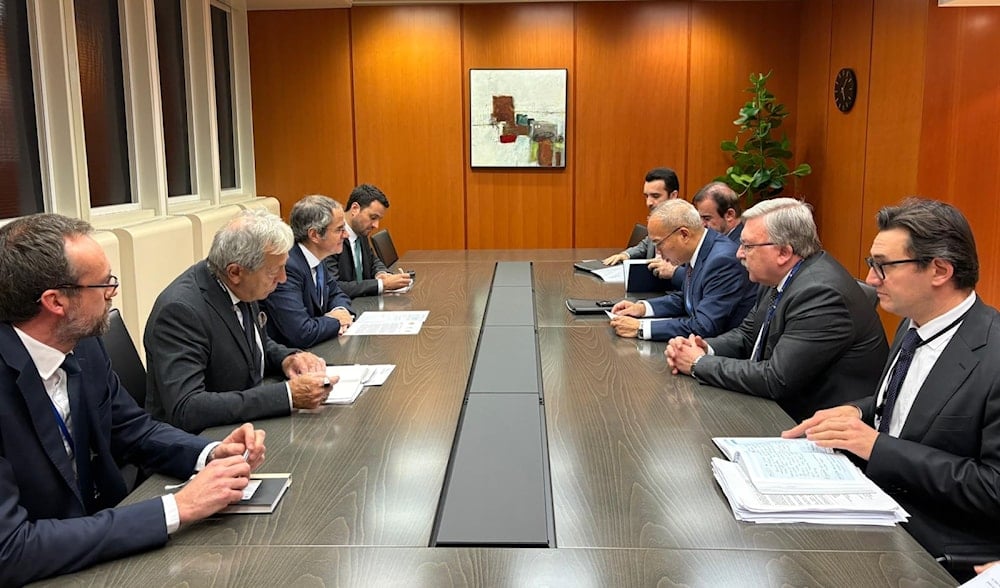Iran-China-Russia meet IAEA chief ahead of Board of Governors session
Iran, China, and Russia meet IAEA chief Rafael Grossi ahead of the Board of Governors session to discuss Iran’s nuclear program under the Safeguards Agreement.
-

Permanent Representatives of China, Iran, and Russia met today with the IAEA Director General Rafael Grossi and his team, Nov 11, 2025 (Mikhail Ulyanov via X)
The permanent representatives of Iran, China, and Russia to Vienna held a joint meeting with International Atomic Energy Agency (IAEA) Director General Rafael Grossi and his team on Tuesday, ahead of the agency’s upcoming Board of Governors session scheduled for November 19–21.
The meeting was announced by Mikhail Ulyanov, Russia’s envoy to international organizations in Vienna. “Permanent Representatives of China, Iran, and Russia met today with the IAEA Director General Mr. Rafael Grossi and his team to exchange views on the forthcoming session of the IAEA Board of Governors,” Ulyanov posted on X.
Permanent Representatives of China, Iran and Russia met today with the #IAEA Director General Mr. Rafael Grossi and his team to exchange views on the forthcoming session of the IAEA Board of Governors. pic.twitter.com/cuhjCcx4px
— Mikhail Ulyanov (@Amb_Ulyanov) November 11, 2025
Iran’s nuclear file to be discussed
In a separate post, Ulyanov said the three nations are “major players” in the context of Iran’s nuclear program, emphasizing that they “decide to a significant extent how the situation will develop.”
The trilateral meeting follows a prior coordination session between the ambassadors of the three countries last week, underscoring their unified stance ahead of the IAEA board's deliberations.
The upcoming Board of Governors session is expected to address Iran’s nuclear activities exclusively within the framework of the Safeguards Agreement, under which the IAEA monitors nuclear programs for compliance with non-proliferation standards.
Iran reiterates commitment to safeguards
Iran has reiterated its commitment to the Safeguards Agreement and stated it will maintain cooperation with the IAEA in line with legislation adopted by the Iranian Parliament earlier this year.
That legislation curtailed Iran’s broader cooperation with the IAEA, suspending voluntary measures such as enhanced inspections. The move came after the IAEA declined to condemn a series of airstrikes by the United States and "Israel" on Iranian nuclear sites in June.
Iran continues to assert that its nuclear program is entirely for peaceful purposes and has repeatedly called on the IAEA to refrain from adopting politicized positions influenced by Western pressure.
Iran-China-Russia cooperation against US unilateralism
Meanwhile, Iranian Foreign Minister Abbas Araghchi, in a phone call with his Chinese counterpart Wang Yi, underscored the growing strategic cooperation between Iran, China, and Russia in confronting Western unilateral policies, namely by the United States, within UN frameworks.
According to Araghchi, the constructive trilateral cooperation holds significant importance and enjoys broad backing from the Non-Aligned Movement, which continues to support multipolar international principles.
Araghchi consistently reiterates the importance of Iran-China-Russia coordination in countering European unilateral measures, particularly those tied to the snapback mechanism, and notes that this cooperation aims to neutralize attempts to reimpose sanctions on Iran outside legitimate frameworks.
Read more: Egypt mediates talks to revive Iran-IAEA nuclear cooperation

 3 Min Read
3 Min Read








